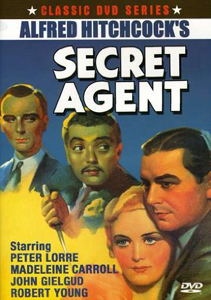“Secret Agent” (1936) feels a little older than the films surrounding it in Alfred Hitchcock’s catalog. It’s a period piece, set in the buildup to World War I (and filmed during the buildup to WWII, although Hitch didn’t know it). And the preservation – on the version I found on Hoopla – isn’t as strong as the surrounding films, as the audio has a scratchy-old-record sound and the video is muddy.
Still, as homework into Hitch becoming Hitch, this adaptation of Somerset Maugham’s 1927 spy tale “Ashenden” is valuable. The director would later use international spy games as escapist entertainment, but during the 1930s and ’40s he examined the art of war more soberly. Famously, he turned “Foreign Correspondent” (1940) into an advocacy piece for the U.S. to help the Allies.
“Secret Agent” examines the moral cost of potential mistakes in spy gaming. Initially, though, the trio on the side of England against the Germans — John Gielgud and Madeleine Carroll as a fake husband-and-wife, and Peter Lorre as the ethnically ambiguous “The General” – are having a swell time.

“Secret Agent” (1936)
Director: Alfred Hitchcock
Writers: Charles Bennett (screenplay), Campbell Dixon (play), W. Somerset Maugham (stories)
Stars: John Gielgud, Madeleine Carroll, Robert Young
Though they’ve just met in their assigned locale in Switzerland, Gielgud’s “Ashenden” and Carroll’s “Elsa” hit it off with their banter. Elsa’s romance on the side with Robert Young’s Marvin is odd, and risqué for the era. These spies have found a job that’s more play than work – except when they have to carry out their assassination assignment (although that is the best part for The General, who is wired … let’s say “differently”).
A high mountain to climb
What proceeds is purposely uncomfortable, leading up to the first scene of pure suspense, where Hitch bites off more than he can chew. Conceptually, it’s neat that a dachshund (“sausage dog” in English parlance) can psychically sense his owner, Percy Marmont’s Caypor, is in trouble. But this is where the ancient sound design gets “Secret Agent” in trouble. As Ashenden, The General and Caypor climb Swiss mountains, we hear footsteps on a wooden floor.
That’s weak even for the era. I’m more forgiving of the grand finale that takes place on … no surprise for those watching all of Hitch’s 1930s British films … a train. Yes, it’s clearly a model train in some shots. But the sequence of airplane bombers attacking a moving train, intercut with the personal dramas of our heroes and villains (or hero-villains?) in the train car, is wildly ambitious – and mildly successful – for 1936.
The performances are distinct, dodging the problem of some old films wherein characters are hard to tell apart since they all dress the same. Gielgud is suave (modern viewers might see Ralph Fiennes in him), Young is happy-go-lucky, Carroll doesn’t make as much impact as other Hitchcock Blondes, and Lorre is rambunctious in a way that was eye-popping in 1936 and now is a tad annoying.

The tone is inconsistent. The scene of Ashenden and Elsa being morally crushed by the action they’ve taken against a supposed German spy is good, but then it’s back to the plot. Although the shots are so dark that – purposely or accidentally – “Secret Agent” evokes the beginning of a grim time in Western Civilization, the film can’t decide if it wants to be a rebuke or celebration of spy games.
Charles Bennett’s adaptation of Maugham’s tale is not bad, but – here’s something rarely said as his career goes on – Hitchcock doesn’t have the master’s touch. While I’m glad I watched “Secret Agent,” I also was thinking it would be nice to see a bigger-budget, more modern version. Unfortunately, it has never been remade. On the other hand, spy games – and men and women thrown together on the run — will come up again in later Hitchcock classics.
RFMC’s Alfred Hitchcock series reviews works by the Master of Suspense, plus remakes and source material. Click here to visit our Hitchcock Zone.

